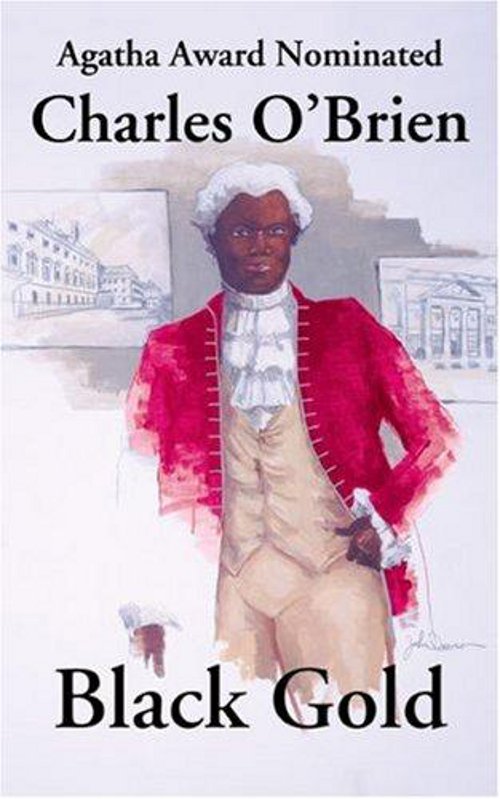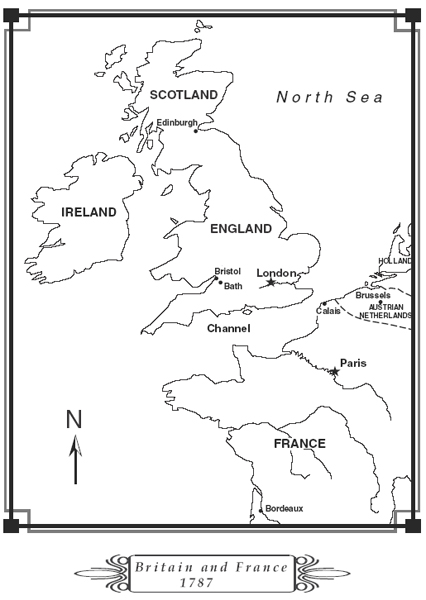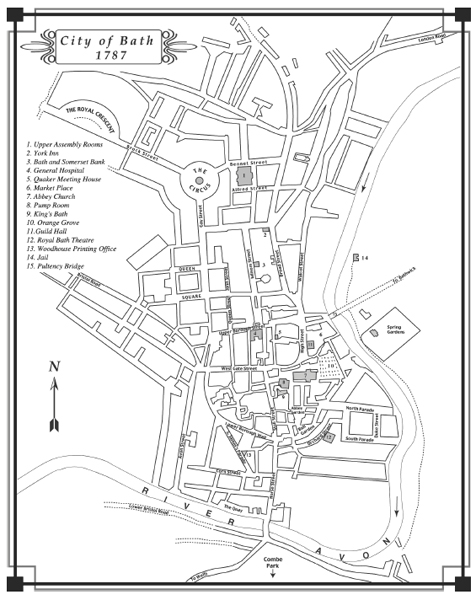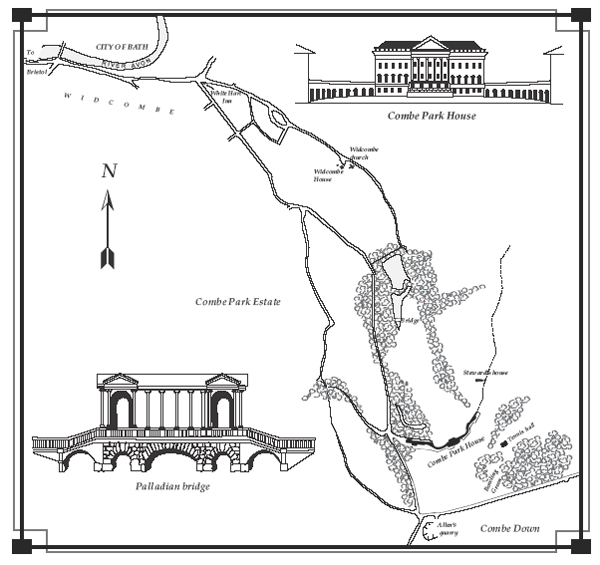Black Gold


Black Gold
Copyright © 2001 by Charles H. O'Brien
First Edition 2002
Library of Congress Catalog Card Number: 2001098493
ISBN-10: 1-59058-010-9 Hardcover
ISBN-10: 1-59058-021-4 Trade Paperback
ISBN-13: 978-1-59058-010-3 Hardcover
ISBN-13: 978-1-61595-144-4 Epub
All rights reserved. No part of this publication may be reproduced, stored in, or introduced into a retrieval system, or transmitted in any form, or by any means (electronic, mechanical, photocopying, recording, or otherwise) without the prior written permission of both the copyright owner and the publisher of this book.
Poisoned Pen Press
6962 E. First Ave. Ste 103
Scottsdale, AZ 85251
For Elvy
I would like to thank Giles Mercer, Headmaster, Lesley Richards, and the dedicated staff of Prior Park College for showing me about the house and discussing its history; the Bath City Archives, the Bath Central Library, and the Bath University Library, for their willing and gracious assistance; Del Davies and the University Housing Office, for making research in Bath both pleasant and convenient.
Marilyn Wright has read
Black Gold
critically at various stages and offered generous insightful comment. Jennifer Nelson of Gallaudet University and David Manning of The Clarke School for the Deaf have given many practical suggestions concerning issues of lip reading and deafness. I am also grateful to Eileen Spring for expert advice on English eighteenth-century custom and law on marriage and divorce; to Ray Gaudette for lending his computer skills; to Gudveig Baarli, for help with the maps; and to Barbara Peters, Rob Rosenwald, and the talented professionals at Poisoned Pen Press.
To my wife Elvy I owe special mention for her expert editorial reading of the book and her many supportive suggestions for its improvement.
Cast of Main Characters in Order of First Mention
| Colonel Paul de Saint-Martin | a French nobleman, provost in the Royal Highway Patrol |
| Comtesse Marie de Beaumont | Saint-Martin's aunt |
| Baron Breteuil | Minister for Paris, distant relative of Saint-Martin and his patron |
| Captain Maurice Fitzroy | an Irishman, womanizer and rogue |
| Sylvie de Chanteclerc | Baron Breteuil's goddaughter, assaulted by Fritzroy |
| Anne Cartier | English actress of French Huguenot descent; also teacher of the deaf |
| Madame Francine Gagnon | a French milliner on Milsom Street, Bath. Spies for Baron Breteuil |
| Georges Charpentier | resourceful assistant to Paul de Saint-Martin |
| André Cartier | Anne's paternal grandfather, a wealthy gunsmith |
| Thomas Braidwood | educator of the deaf |
| Jack Roach | a clever criminal; Anne Cartier's particular enemy |
| Charlie Rogers | 11-year-old deaf son of Lady Margaret and Sir Harry |
| Lady Margaret [née Pakenham] | an Irish noble woman, married to Sir Harry Rogers |
| Mary Campbell | young woman, Charlie's first tutor, died of a fall |
| Sir Harry Rogers | wealthy slave trader from Bristol, husband of Lady Margaret |
| Harriet Ware | Anne Cartier's best friend, a singer and dancer. Sir Harry is her patron |
| William Rogers | Sir Harry's nephew, a 15 year old cheat and bully |
| Edward Critchley | William's learned tutor |
| Jeffery | also called Lord Jeff. A black slave, footman at Combe Park, and a boxer |
| Peter Hyde | Sir Harry's coachman and former boxer |
| Dick Burton | Bow Street officer from London |
| Betty Murphy | elderly Irish woman in Bristol, nurse to Lady Margaret and her son Charlie |
| David Woodhouse | Quaker printer and abolitionist |
| Sarah Smith | seamstress, free black woman and Jeffery's friend |
A Family Matter, Winter 1787
Saturday, January 6
The sky was overcast, the thin light of day rapidly fading. Gusts of freezing wind whipped up dust in the courtyard. Colonel Paul de Saint-Martin left his cabriolet in the care of a groom and stepped into the entrance hall. He shivered. The room was unheated and the chill of the ride from Paris was in his bones. His Aunt Marie had suddenly called him to Chateau Beaumont, her country residence a few miles south of the city.
“May I take your cloak, sir? The Comtesse is with Baron Breteuil in the library.” The doorman gathered the garment on his arm. “She is expecting you.”
A liveried footman led the colonel through the building to a closed door and knocked. At a soft command from within he opened the door.
Saint-Martin entered the library, raised his arm in greeting. A strange, heavy atmosphere pervaded the room. Darkness seeped through the windows; dozens of candles struggled to dispel the gloom. Their light flickered on the gilded spines of books. Eerie shadows danced on the high stuccoed ceiling.
“I understand we're gathered here to deal with a family matter,” said Saint-Martin with a frisson of apprehension. He glanced at his mentor and distant relative, Baron Breteuil, who rose from his chair. The man was grim-faced. And so was Comtesse Marie, who came forward to greet him, her brow knitted with concern. What could be so serious? True, the baron often looked grim these days when dealing with affairs of state as the king's minister for Paris. The government was virtually bankrupt. Its critics demanded deep cuts in expenditures and the right to approve new taxes. The baron mumbled a greeting through tight lips, then fell silent.
But Aunt Marie? What troubled her? Saint-Martin could not recall ever seeing her in such distress. She was usually lighthearted and gay, a welcome tonic when his own spirits were depressed. This evening she gave him a weak, distracted smile and inquired about his health.
Servants arranged three chairs at a small table. Tea was poured, sweetcakes served, and the servants withdrew.
When the door closed, the baron put his cup down with a clatter. His hands gripped the arms of his chair. He threw a glance toward the comtesse, then addressed Saint-Martin. “I'll come right to the point, Paul. I'm asking you to pursue a certain Irishman, Captain Maurice Fitzroy, at one time in our king's service in the Dillon Regiment.”
“We've never met, though I've heard his name mentionedâa gambler and a rake.”
“An expert gambler, indeed! He has won large sums of money from Comtesse Clare, my cousin.” The baron paused for a deep breath. “I could forget about the money. She was foolish to risk it. But I cannot overlook what he did to my godchild, Sylvie.”
The baron yielded to Comtesse Marie, who reminded her nephew, “She's my godchild as well, and your distant cousin.”
Saint-Martin felt a tightening in his chest. He knew Sylvie de Chanteclerc from summers he had spent at Chateau Beaumont a decade ago. She'd have been eight or nine years old at the time. A sunny child, always eager for a new game. A few months ago over coffee in the Palais-Royal, they had renewed their acquaintance and promised to meet again soon. He had been struck by her uncanny resemblance to his friend, Anne Cartierâlively blue eyes, blond hair, fair complexion.
“She's a spirited, sensible girl of nineteen,” the baron continued. “For some time, the Irishman attempted to court her. At first, she found him handsome and charming. They met on a few occasions, but she came to distrust him. Polished on the surface. Mean and deceitful underneath. When she tried to discourage him, he pressed his suit even more ardently. Two days ago, she finally rebuffed him.” The baron paused, swallowed, then went on, his voice just above a whisper. “The monster found her alone, beat and raped her. He spread the rumor that she had complied gladly, that I had punished her.” The baron looked down, stroking his forehead.
Saint-Martin gasped, turned to his aunt. “When did this happen? I hadn't heard. I just got back from Rouen.”
“Late Thursday evening,” she replied. “At the baron's chateau while he was in Paris. Sylvie had sent Fitzroy away. But he only pretended to leave the estate and hid somewhere on the grounds. When everyone had gone to bed and the house was quiet, he sneaked through a window he had earlier unlatched. In a footman's disguise, he made his way to her room, bound and gagged her, violated her. A pair of trusted servants found her unconscious yesterday morning.”
The comtesse excused herself and pulled on a bellrope. A maid appeared. The comtesse spoke into her ear and sent her off, then resumed her account. “When Sylvie recovered consciousness, she was in shock and wouldn't talk to anyone. She was brought here last night, started to feel better, and told me what had happened. I wrote to the baron at once.”
“Aunt Marie⦔ Saint-Martin struggled for words. “I can hardly believe it! Poor Sylvie!”
“But it's true.” The comtesse fell silent and took a deep breath. “She allowed me to verify the evidence on her body.”
“And you can see for yourself,” came a strained voice from behind Saint-Martin. He heard the rustle of a garment and looked over his shoulder. A young woman wrapped in a plain brown dressing gown stepped out of the shadows. Her hair was covered by a gray bonnet that shadowed her face. Obviously in pain, she managed to hold herself erect.
She bowed to the baron and the comtesse, then approached Saint-Martin, who rose from his chair. “Colonel,” she said, curtseying stiffly before him.
“Sylvie.” His voice faltered. Shocked by her altered appearance, he glanced toward his companions. Their eyes had fastened on him.
Untying the bonnet, she moved a step closer, then bent forward into a candle's light. “He did this, Colonel.” She removed the bonnet and tentatively touched her face with her fingers, as if to confirm the damage. The left side was deeply discolored, the eye half-closed. Her lips were swollen.
Saint-Martin felt his gorge rising. “My God!” he breathed.
Stepping back, she pulled open her gown and let it fall over the cord at her waist.
Out of respect, Saint-Martin instinctively tried to avert his eyes. But Sylvie held his gaze. She pointed to dark bruises on her side. She coughed slightly, grimacing with pain.
“He kicked her and broke two ribs,” said Comtesse Marie. She hurried to the young woman, wrapped her again in the gown and gently embraced her.
Sylvie cast her a thin smile, then turned back to Saint-Martin. Wrath worked the lines of her mouth. “Fitzroy claims I invited him to my room and the baron beat me for having dishonored the family name. But I swear before Almighty God, the Irishman lies.” Her voice dropped to a hoarse whisper. “I want you to kill him.”
The baron rose to his feet and shook his fist. “Death would be much too quick, too gentle!”
Sylvie sagged into the comtesse's arms, then forced herself upright. “Kill him!” she cried, her voice low and hoarse. The two men looked on while Comtesse Marie helped her from the room.
When the door closed behind the women, the baron began to pace the floor furiously, staring ahead, pounding his fist into the palm of his hand. After a few minutes, he sat at a desk and waved Saint-Martin to a chair facing him. He held up a document. “This is the king's
lettre de cachet
, a secret order for Captain Fitzroy to be held in solitary confinement for the rest of his life in a royal prison.” He handed it to Saint-Martin, adding, “I'm ordering you to execute the royal command.”
Shocked by Sylvie's tragedy, Saint-Martin could only nod his assent. For a few seconds he struggled to control his feelings, then found his voice. “The captain's behavior revolts me, sir. Where shall I catch him?”
“The scoundrel disappeared from Paris yesterday, after claiming he was about to be accused of a crime he hadn't committed. I assume he'll flee to England, but he may go there by way of the Low Countries. He knows we will watch the French channel ports closely. I want you to organize a search. Alert the posts of the Royal Highway Patrol at the frontiers. As far as the public is concerned, he is wanted for questioning concerning allegations of fraud.”
“May I inquire, sir, why you secured the
lettre de cachet
instead of a warrant for his arrest?” Saint-Martin took a dubious view of this arbitrary procedure that lent itself so easily to abuses of the worst kind. An innocent man could be plucked from his home in the middle of the night and imprisoned without trial, without knowing his accuser or the crime of which he was accused.
The baron leaned forward, arms on the desk, hands clasped tightly. “I want to spare Sylvie the horror and shame of a public trial. She would have to reveal what happened. Judges would question her testimony, probing into the most intimate details. Every hack scribbler in Paris would spread lurid tales about her.”
Saint-Martin agreed. “She should not have to endure the tearing open of such a wound.” And, to make matters worse, he thought to himself, she could lose the case. Fitzroy might go free. The crime of rape was difficult to prove. And the baron had powerful enemies in high places who resented his great influence at court or had been stung by his sharp tongue. They would be eager to credit Captain Fitzroy's tale.
“Well, there you have it,” said the baron, rising from the desk, the discussion at an end. “Fitzroy is guilty beyond a doubt and must be secretly imprisoned. Once in chains, I can assure you, he will suffer the torments of the damned.”
Tuesday, March 20
Colonel Paul de Saint-Martin removed his gloves and flicked specks of dust off his red lapels. Baron Breteuil had summoned him to his office in the royal palace at Versailles. The colonel sighed softly. Ten weeks had passed since Captain Fitzroy had assaulted Sylvie and the rogue was still at large.
Saint-Martin surveyed the antechamber. At this late morning hour the room was crowded with petitioners waiting for an audience, most of them supercilious aristocrats, fashionably dressed. They passed the time exchanging bits of court gossip. To judge from the impatient glances they threw at the baron's door, each of them felt entitled to enter immediately.
The colonel smiled to himself. He would be shown into the office before any of them. The baron's message was cryptic and urgent. Something must have happened concerning Captain Fitzroy.
Punishing the knave lay very close to the baron's heart. He had been sorely troubled that the search had thus far been fruitless. Fitzroy had indeed fled to the Low Countries, keeping a step ahead of the French agents pursuing him. Saint-Martin himself had travelled to Brussels and received full cooperation from the Habsburg authorities. In vain. Fitzroy had disappeared, most likely into Germany or England.
A liveried servant opened the office door and with a bow invited Saint-Martin in. The waiting crowd stirred. A titter of chagrin trailed after him.
Baron Breteuil rose from behind his desk and greeted the colonel with a smile. “Paul, I believe we've found the Irish scoundrel.” He sat down again, beckoning Saint-Martin to a chair opposite him. “I can't tell you how pleased I am.”
“Where is he?”
“In England.” The baron was silent for a moment, allowing the new diplomatic complications of the case to sink into Saint-Martin's mind. “One of my agents, Madame Gagnon, a milliner, has spotted him in Bath under his own name. Maurice Fitzroy! Would you believe it! The bold villain!”
The colonel weighed the baron's words carefully before replying. “That's bad news for us. He's a devil, not a fool. He must have found powerful men to protect him, so he now feels secure.”
Breteuil shrugged his shoulders, then pushed a sheet of paper across the desk. “A description of the milliner and the address of her shop. I want you to call on her.”
So that's what this conversation was all about, Saint-Martin thought. He must pursue Fitzroy in England. He folded his arms across his chest and leaned back listening, while the baron went on about the milliner's report. Saint-Martin's mind soon began to wander, distracted by a large map of western Europe on the office wall. His eyes fixed on England. Suddenly, London leaped out at him.
Unbidden, an image crept into his mind. A tall, lithe young woman with golden blond hair and blue eyes. Anne Cartier. He had longed for months for her to return to Paris. Fond memories surfaced: beads of dew dripping from a rose onto her sleeve, a ride together in the woods near Wimbledon. Was Providence now sending him to her? From her last letter, he knew she would be in London yet a little while longer. They could surely meet again as he passed through en route to Bath.
The baron tapped his fingers on the desk. “A certain aspect of this mission seems to appeal to you, Colonel. Bath may be the loveliest city in Britain and offers pleasures to suit every taste. But you will be there on serious, dangerous business.”
Caught day-dreaming, the colonel quickly collected himself. “I'm fully aware of that, sir. Fitzroy's wily as well as ruthless.” From the report of others, Saint-Martin had formed a mental picture of this foe he had yet to meet. Medium height, slender build, wavy black hair, soft blue eyes, high forehead and refined, delicate features. This almost feminine appearance masked the strength and agility of an athlete. An accomplished fencer, he was also expert with dueling pistols.
“May I ask, Baron, why you have chosen me for this mission rather than, say, an experienced agent like Inspector Quidor?”
“We're dealing with a family matter, Colonel, as well as a crime. You have a personal interest in the mission and the discretion to carry it out properly. I can trust you to avoid diplomatic complications. You know the English and their ways and speak their language. Our relations with them are tense at present. They fear we shall intervene in the quarrel among the Dutch, clash with the Prussians, upset the balance of power in the region. In a few words, you will abduct Fitzroy for me without making a mess. Quidor is clumsy, as we learned in the necklace affair.”




